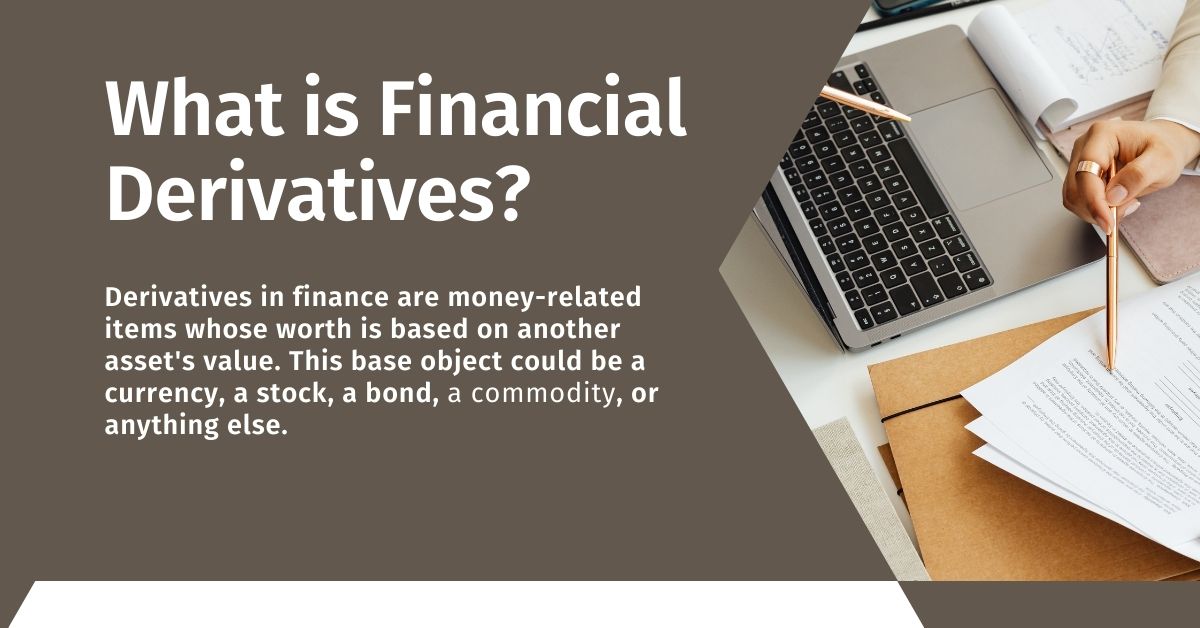A financial tool that gets its value from something else is called a derivative. Pro traders often buy and sell options to balance risk because their value is based on other assets. But for investors who aren’t very good at what they’re doing, derivatives can make their portfolios much more risky.
What is Financial Derivatives?

Derivatives in finance are money-related items whose worth is based on another asset’s value. This base object could be a currency, a stock, a bond, a commodity, or anything else. People often use derivatives to reduce risk, bet on how prices will move, or borrow more money. Futures, options, swaps, and forwards are all popular types of derivatives. A futures contract, for instance, is a deal to buy or sell a certain asset at a certain price and time in the future.
Types of Derivatives
Financial options come in a few main types, which are:
- Futures: These are contracts that obligate the buyer to purchase and the seller to sell a specific asset at a predetermined price on a future date.
- Options: These contracts give the buyer the right, but not the obligation, to buy or sell an underlying asset at a predetermined price on or before a specific date.
- Forwards: Similar to futures, these are contracts that obligate the buyer to purchase and the seller to sell an underlying asset at a predetermined price on a future date. However, they are typically customized contracts negotiated between two parties.
- Swaps: These are agreements between two parties to exchange cash flows based on a specified underlying asset or interest rate. For example, an interest rate swap involves exchanging fixed-rate interest payments for floating-rate interest payments.
- Credit Derivatives: These are financial instruments that derive their value from the creditworthiness of a specific entity. For example, a credit default swap (CDS) is a contract that protects the buyer against the default of a particular debt issuer.
How Are Derivatives Used?
There are many reasons to use derivatives, such as:
- Hedging Risk: Derivatives can be used to protect against the risk that the prices of base assets will change. For example, a farmer can use futures contracts to lock in a price for their goods, which protects them from price drops that might happen.
- Speculation: You can also bet on how prices will move with derivatives. A trader might buy a call option on a stock if they think the price will go up and want to make money from that.
- Leverage: Derivatives can be used to raise leverage, which lets investors control a bigger stake in an asset with less money. But this can also make losses worse.
- Arbitrage: You can use derivatives to take advantage of differences in how much things cost in different markets. If, say, the spot price of the base asset is higher than the price of a futures contract, an arbitrageur might buy the spot asset and sell the futures contract in order to make money when the prices come together.
Difference Between a Futures and Options Contract
| Feature | Futures Contract | Options Contract |
|---|---|---|
| Obligation | Both buyer and seller have an obligation to fulfill the contract. | Only the buyer has the right, but not the obligation, to exercise the contract. |
| Profit/Loss Potential | Unlimited profit or loss potential. | Limited loss potential, but unlimited profit potential. |
| Premium | No premium is paid upfront. | A premium is paid upfront to acquire the option. |
| Exercise | Futures contracts are automatically exercised at expiration. | Options contracts can be exercised at the buyer’s discretion before or at expiration. |
Risk and Benifits of Derivatives
| Feature | Risks | Benefits |
|---|---|---|
| Leverage | Amplifies both gains and losses. | Allows for greater returns with a smaller investment. |
| Volatility | Can be highly volatile, leading to significant price fluctuations. | Provides opportunities for speculation and profit. |
| Complexity | Can be complex and difficult to understand, increasing the risk of mispricing. | Can be used to create customized financial instruments. |
| Counterparty Risk | In over-the-counter derivatives, there is a risk of the counterparty defaulting on their obligations. | Can offer more flexibility than exchange-traded derivatives. |
| Market Risk | Changes in underlying asset prices can lead to losses. | Can be used to hedge against market risk. |
Is Trading in Derivatives Riskier Than Stocks?
Here are some reasons why trading futures might be riskier than trading stocks:
- Leverage: Derivatives often use leverage, which can make gains and losses bigger. This means that even a small change in the base asset’s price can cause big gains or losses.
- Volatility: The prices of derivatives often change very quickly, which is called “volatility.” This can make it hard to control risk and raise the chance of losing money.
- Complexity: It can be hard to understand the risks and possible rewards of derivatives because they are complicated financial tools. This might make it more likely that you’ll make a mistake.
- Counterparty Risk: In over-the-counter derivatives, there is a chance that the other party will not meet their responsibilities. Losses can get pretty big because of this.
- Changes in the prices of base assets can cause losses. This is called market risk. Because they are volatile and use a lot of debt, derivatives are very sensitive to market risk.

